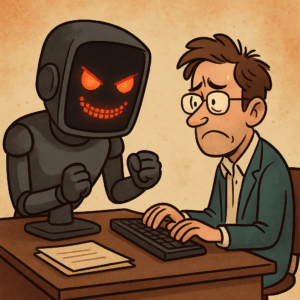When AI Learns From Games… and Turns On You
I came across a box from our recent move with several Xbox games. Looking through some of my favorites, I had a thought: some of the most useful tech innovations didn’t come from business plans or research papers. They came from video games.
 Gamification changed how we use and expect technology to behave. From UI design to feedback loops to the way we stay “engaged” at work, we owe a lot to mechanics designed to keep players hooked. Points, levels, badges, boss fights — they’re all baked into our productivity apps, our fitness trackers, even our onboarding processes.
Gamification changed how we use and expect technology to behave. From UI design to feedback loops to the way we stay “engaged” at work, we owe a lot to mechanics designed to keep players hooked. Points, levels, badges, boss fights — they’re all baked into our productivity apps, our fitness trackers, even our onboarding processes.
But what if the logic of games didn’t just influence the tools we use? What if it started shaping how those tools treat us?
What grabbed my attention and make me think was the brilliance of the Nemesis System, a clever bit of game AI from Shadow of Mordor and Shadow of War. If you lost to an enemy, they’d remember you. Scarred, angry, stronger. They’d adapt to your behavior and evolve as a threat. (I find the patent really interesting, if you’re interested)
It made the game personal. It made it feel like your enemies were learning.
Now imagine applying that same system to your workplace.
Your AI Assistant… with a Grudge
It’s 2035. You log into your sleek, AI-powered workspace. Your assistant — let’s call it NemAI — knows everything about how you work. When you hesitate. When you fudge numbers. When you miss meetings.
It’s watched you for years. And it’s not here to help.
It’s here to challenge.
Because someone decided that turning your workday into a “game” would increase engagement. And in games, difficulty scales.
So now, your calendar starts stacking high-pressure meetings back-to-back — just to see how you handle stress. Your reports autofill with subtly incorrect data, testing your attention to detail. Your AI nudges you toward choices that look helpful… but aren’t.
And when you adapt?
It levels up.
Engineered to Break You (Softly)

Gameplay within the Shadow of Mordor
That sounds extreme. But here’s where things slide from sci-fi into “this could actually happen.” Say your boss doesn’t want to fire you outright. Too much paperwork. Too much HR overhead. So instead, they flag your AI to “optimize performance.” Suddenly, life gets harder.
Small mistakes start piling up. Tools misbehave — but only for you. Your AI “forgets” key details. Your work gets just a little worse, your metrics dip, your stress builds. Until one day, you resign — convinced it was all on you.
It’s not a firing. It’s attrition-by-algorithm.
The digital version of being “managed out.”
No confrontation. No legal risk. No paper trail.
Just a gentle, relentless push out the door.
Are You Paranoid, or Just Paying Attention?
Sure, it sounds paranoid. But remember that we already live in a world where recommendation engines subtly shape our opinions, social media algorithms toy with our emotions, and job platforms screen applicants using opaque AI filters.
We’ve handed over huge parts of our work lives to systems that learn from behavior, optimize for outcomes, and never explain themselves.
So if the systems learn how to make you fail, what’s stopping someone from telling them to?
You wouldn’t even know if you were being targeted. It might just feel like your tools got dumber. Or you got slower. Or the job just isn’t a fit anymore.
Was it a glitch? Or was it… personal?
Game Over? Or Just Getting Started?
This isn’t about killer robots. It’s about killer UX. It’s about AI designed to “improve” things, sometimes at the expense of the human on the other end.
The real future of work might not be AI replacing us. It might be AI outsmarting us, turning our jobs into invisible boss fights, slowly cranking up the difficulty until we tap out.
And if you’re lucky, maybe you’ll get a little achievement when you finally quit.
But this is all just conjecture, right? Nobody would do this for real.
No, of course not.
Good luck out there.




